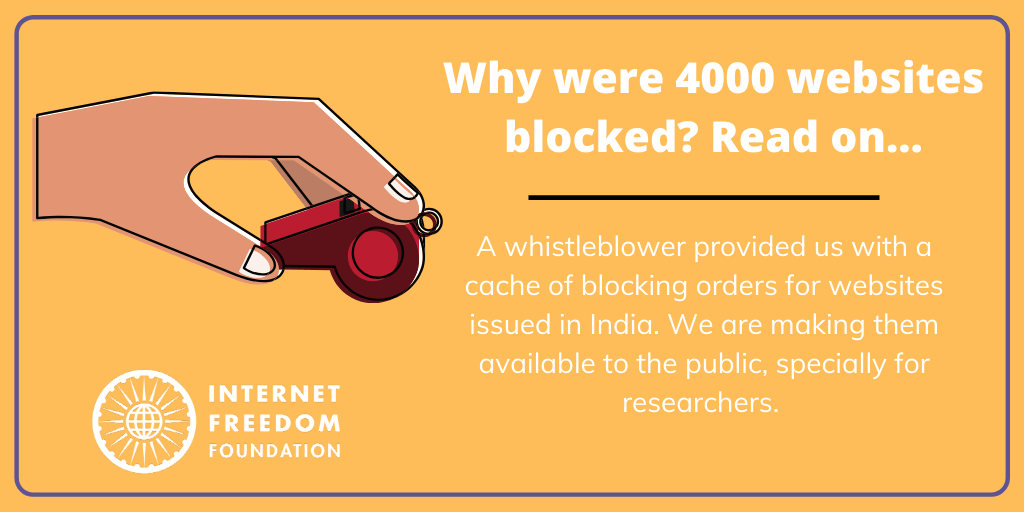
TLDR
A whistleblower provided us with a cache of blocking orders for more than 4000 websites issued in India. We are making them available online as they form an essential resource for the public and researchers. As per our initial analysis a majority of website blocking being done due to copyright claims and court orders.
Public Disclosure : reducing secrecy and opacity
Website blocking is a complex issue which seems to be growing in severity only with time. Ordinary Indians who access the internet --- which is a public resource -- still do not know the reason why a specific website is blocked. Sometimes, even the persons who run these websites do not have knowledge as to the reasons and the legal authority which has directed the blocking of websites.
We have earlier explained the legal position in respect of porn websites, how sometimes blocking is inconsistently done at the ISP level, and done a preliminary analysis of the several orders we had received through RTIs. Our continuing attempts to increase transparency around this issue received a boost. A whistleblower has provided orders sent by courts and government authorities to Internet Service Providers across India. These contain more than 64 documents and provide explanations for the blocking of about 4398 websites. Today we are publishing them for public knowledge and the wider research community.
Preliminary inferences
We have three preliminary inferences to share on these orders. While offering these inferences we would like to point out that this is a limited data set and is likely to display a bias given the total data field of all blocking orders is not publicly available. At the same time we find value in providing an initial analysis that confirms several points on the reasons for blocking, or the more recent instance of how the WeTransfer block was effected without proper transparency.
- Courts are primary actors: The public authorities from which most of these orders arise are from courts situated in Delhi and Chennai. This is principally the High Court of Delhi and the High Court of Madras. The nature of the orders are interim injunctions on claims by content owners. Here quite often file sharing and movie streaming websites are being blocked. Here processes for specific takedowns on URLs is not the preferred route but entire websites are blocked. A casual read through the list of URLs confirms this.
- Website blocking is inconsistent: Internet users all across India who use different ISPs have very different experiences on website blocking. This may be due to the technology used, the nature of blocking that is affected and varies from each ISPs compliance in each specific region where they may be offering services through a different technical infrastructure. This is specifically through Document No. 59 which is a non-compliance report in which correspondence was specifically directed to ISPs to block websites in terms of an earlier order.
- Lack of opposition and transparency: Despite the large impression carried that a majority of blocking orders are affected by Government, as stated these primarily occur through infringement claims made by private parties. In most of these cases the defendants are a few websites, ISPs and Government Departments. It is not clear whether any opposition is presented and whether a high level of scrutiny is visited prior to the directions for blocking being made. While many of such claims may be legitimate there do exist legitimate arguments on proportionality and how over-broad intellectual property enforcement results in deprivations of the public’s right to access materials online. This issue is further compounded by the insufficient notice to people as there does not exist any central, or government repository for housing and publishing their directions for blocking websites.
The Tanul Thakur Case
We have identified that it is a lack of proactive publication and transparency in India’s blocking process whether through courts or executive bodies which is causing a fracture of public trust in the exercise of this power. At present there is a writ petition pending before the High Court of Delhi regarding the blocking of the satirical website, “Dowry Calculator”.
We have been working with Tanul Thakur, the petitioner and the creator of this website since May, 2019 with drafting and filing RTI applications and we also assisted with the writ petition. Our hope through this intervention is that it helps support greater transparency and the norms of proper notice to website creators, hearings in which they can put forward a defence followed by a public disclosure of the decision. You can read more about this case here, from when notice was first issued, to the stand taken by the government. As always, IFF is committed towards working relentlessly towards protecting your digital rights.
Links
- Data dump of the documents provided on Website Blocking [link]
- Sheet of the 4398 websites blocked as per the Whistleblower Documents [link]
- Representation to the Department of Telecom to unblock WeTransfer [link]
- Analysis URLs blocked under court orders made available under RTI [link]
- Challenge the website blocking of Dowry Calculator [link]

